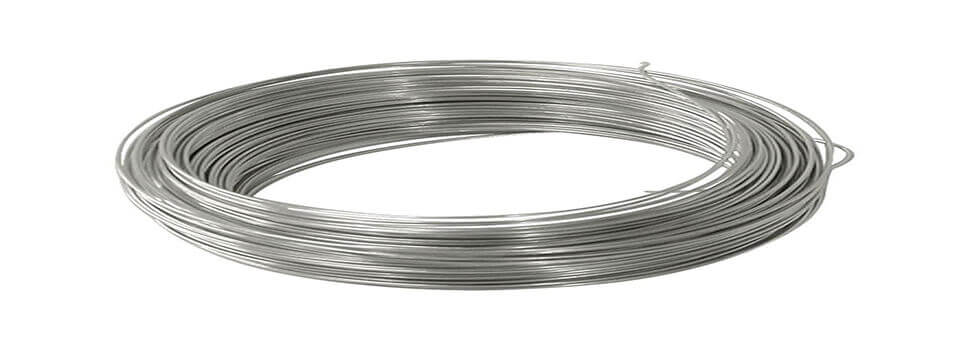Titanium Grade 2 Wire Manufacturers, Titanium Grade 2 Wire Exporters, Titanium Grade 2 Wire Suppliers, Titanium Grade 2 Wire Importers, Titanium Grade 2 Wire Stockists
Titanium Grade 2 Wire Manufacturers in Mumbai, Titanium Grade 2 Wire Exporters in Mumbai, Titanium Grade 2 Wire Suppliers in Mumbai, Titanium Grade 2 Wire Importers in Mumbai, Titanium Grade 2 Wire Stockists in Mumbai
Titanium Grade 2 Wire Manufacturers in India, Titanium Grade 2 Wire Exporters in India, Titanium Grade 2 Wire Suppliers in India, Titanium Grade 2 Wire Importers in India, Titanium Grade 2 Wire Stockists in India
Titanium Grade 2 has good strength to weight ratio, maintained at high temperatures.Available in Round wire, Bars or lengths & Flat wire.Titanium Grade 2 is also known as Timetal 50A, Titan Grade 2, and Allvac 40.Titanium Gr.2 Wire, Grade 2 Titanium Coil Wire,Ti. Alloy Gr.2 Wire, Alloy Gr.2 Wire, ASTM B863 Titanium Wire Suppliers and Exporters in Mumbai, India. Tig Wire Welding, Mig Wire Welding, Tig Welding Spool, Mig Welding Spool.
Titanium Grade 2, which oppositely impacts flexibility and its substance kept as low as could be permitted. In the greater part of these and other structure applications, Titanium Grade 2 Wire has replaced heavier, less steady or less reasonable materials. Titanium Grade 2 Coil Wire is the best among financially unadulterated titanium grades, where it is the gentlest and most malleable rose up out of appraisals.
Normal applications for Titanium Grade 2 wire compound framework, oil refining, biomedical relatively as warmth exchangers in a course of action of different applications. Titanium Grade 2 are light in weight, have grand utilize square and the ability to withstand astonishing temperatures.
Titanium Grade 2 Wire is used commonly in applications that require welding in perspective on its strong weldability properties. Ti Gr. 2 Filler Wire is higher in quality than CP Grade 1, regardless lower in quality than CP Grade 3 and CP Grade 4. Ti Gr. 2 Electrode is used in flight, flying, military, structured, petrochemical industry, in the remedial field, embellishments, change of estimation instruments, attacking purposes.
Titanium Gr. 2 Welding Electrode is other than used in Architecture, Automotive Desalination, Dimensional Stable Anodes, Medical, Marine, and Processing and Chlorate Manufacturing. As a singular – sort out material, the properties of Ti Gr. 2 Welding Wire are obliged by science (iron and interstitial polluting impact parts) and grain measure.
Titanium grade 2 Wire Specifications
| Specifications | : | ASTM B863 ASME SB863 |
| Dimensions | : | ANSI/AWCI – 01 -1992 and ASTM E 2016-11 and RRW 360 |
| Length | : | 100 mm TO 6000 mm |
| Diameter | : | 0.01 mm To 200 mm |
| Specialize | : | Filler Wire, Coil Wire, Electrode Wire, Welding Wire. |
Equivalent Grades for Grade 2 Titanium Wire
| STANDARD | WERKSTOFF NR. | UNS |
| Titanium Grade 2 | 3.7035 | R50400 |
Grade 2 Titanium Wire Chemical Composition
| Grade | Ti | C | Fe | H | N | O |
| Titanium Grade 2 | 99.2 min | 0.1 max | 0.3 max | 0.015 max | 0.3 max | 0.025 max |
Titanium Grade 2 Wire Mechanical Properties
| Density | Melting Point | Tensile Strength | Yield Strength (0.2%Offset) | Elongation |
| 4.5 g/cm3 | 1665 °C (3030 °F) | Psi – 49900 , MPa – 344 | Psi – 39900 , MPa – 275 | 20% |
Titanium Grade 2 Wire Applications
- Off-Shore Oil Drilling Companies
- Power Generation
- Petrochemicals
- Gas Processing
- Pharmaceutical Equipment
- Chemical Equipment
- Sea Water Equipment
- Heat Exchangers
- Condensers
- Pulp and Paper Industry

